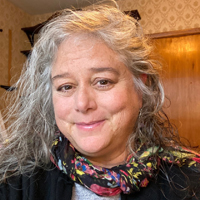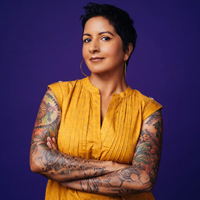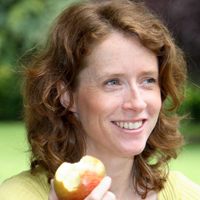We Are Women and We Have Parkinson’s Disease
Forty percent of people living with Parkinson's disease worldwide are women. That is no small number. That means in any game of football (or soccer in America) almost half the team on the field would be women with Parkinson’s. This is not an insignificant ratio. One would think that number would be enough to warrant specific treatment addressing women’s needs, yet it is not the case.
Women often receive the same dosage of medication despite differences in weight, drug metabolization and of course, the big H, hormones. Dyskinesia and dystonia often affect women, particularly younger women, more frequently. Little research has been done in this area. Treating people with Parkinson’s requires personalization, i.e., considering their sex, differences in their roles at home and within society, differences in their psychology. We must also remember the historical context of how women have often been silenced when it comes to their own health.
As women advocating for representation within the larger PD community, we are privy to many conversations that point to the lack of resources that speak to our experiences and needs. Women have reported in forums, emails and in-person conversations, the lack of information on symptoms, and side effects as they relate to menstrual cycles. Even unrelated to Parkinson’s disease there is often little guidance provided to women from menarche to menopause about how to navigate the symptoms of hormonal changes. Throw in the cocktail of symptoms that PD gives us, and you’ve got a Molotov Bloody Mary that can often debilitate us.
The utter void in research about hormonal fluctuations is shocking and must be corrected. Women are often the nurturers, caregivers, and primary source of emotional support for families and communities. The process of diagnosis without attention to our vital role in society is not only frustrating but often scary and debilitating. Highlighting the differences that women face after a diagnosis of Parkinson's will benefit everybody living with this incurable neurological condition. Care must become more tailored to the specific needs of women. This specificity can improve the individual lives of all people living with Parkinson's around the world.
In the recent paper titled “Unmet Needs of Women Living with Parkinson's Disease: Gaps and Controversies” quotes “a better understanding of PD for some means a better understanding of PD for all,” a customized precision-based approach to clinical trials will allow the betterment of care for all people living with PD worldwide.” We need better understanding of PD in general, for men and women, for old men and old women, for young men and young women. But let us be clear, our focus is on women. We believe that a better understanding of PD for women means a better understanding of PD for all. And that understanding allows us to not only take better care of ourselves, but our loved ones, our partners, our family, our community, and our society.
They say it takes a village. Let’s create that village by providing women with the care they need, they deserve, and they demand. The three of us met through attending WPC 2019 in Kyoto which led to shared experiences and friendship. Our frustrations around our own unmet needs and those of the many women we knew with PD was the impetus to co-founding The Women’s Parkinson’s Project.
Our mission is to raise our voices for better treatment and research for women with Parkinson’s. They say it takes a village. Let’s create that village by providing women with the care they need, they deserve, and they demand. Let us raise our voices together!
Learn more about us by visiting our www.womensparkinsonsproject.com or following us on social media.
Join us for the WPC Partner Highlight Webinar to mark International Women’s Day on the 8th March where our co-founder Richelle Flanagan will moderate the panel of co-authors of the recently published paper Subramanian I, Mathur S, Oosterbaan A, Flanagan R, Keener AM, Moro E. Unmet Needs of Women Living with Parkinson's Disease: Gaps and Controversies. Mov Disord. 2022 Jan 20. doi: 10.1002/mds.28921. Epub ahead of print. PMID: 35060180.
Register today to hear the research discussed and have your questions answered.
 Kat Hill
is a Co-Founder of the Women's Parkinsons' Project. She was diagnosed with Young Onset Parkinson’s Disease after delivering over 800 babies in her career as a Nurse Practitioner and Midwife. She is an ambassador for the Davis Phinney Foundation and is publishing her first book, titled “Being Well.” Kat Hill
is a Co-Founder of the Women's Parkinsons' Project. She was diagnosed with Young Onset Parkinson’s Disease after delivering over 800 babies in her career as a Nurse Practitioner and Midwife. She is an ambassador for the Davis Phinney Foundation and is publishing her first book, titled “Being Well.”
|
 Sree Sripathy
is a Co-Founder of the Women’s Parkinson’s Project. She was diagnosed with Young Onset Parkinson’s Disease in 2015. She is a writer, photographer and artist, works full-time in tech and is an ambassador for the Davis Phinney Foundation. Sree Sripathy
is a Co-Founder of the Women’s Parkinson’s Project. She was diagnosed with Young Onset Parkinson’s Disease in 2015. She is a writer, photographer and artist, works full-time in tech and is an ambassador for the Davis Phinney Foundation.
|
 Richelle Flanagan
is a Co-Founder of the Women’s Parkinson’s Project. She was diagnosed with Parkinson’s disease a few months after giving birth to her second child. Richelle has a Masters in Nutrition & Dietetics and a Postgraduate Certificate in Allergy. She is a founding member of the PD Avengers and WPC 2023 Ambassador for the 6th World Parkinson Congress. She is based in Dublin, Ireland. Richelle Flanagan
is a Co-Founder of the Women’s Parkinson’s Project. She was diagnosed with Parkinson’s disease a few months after giving birth to her second child. Richelle has a Masters in Nutrition & Dietetics and a Postgraduate Certificate in Allergy. She is a founding member of the PD Avengers and WPC 2023 Ambassador for the 6th World Parkinson Congress. She is based in Dublin, Ireland.
|
Ideas and opinions expressed in this post reflect that of the author solely. They do not reflect the opinions or positions of the World Parkinson Coalition®